That 'Eureka' moment: what The Witness is really about
Massive spoilers for The Witness follow
It's easy to come up with a ridiculous number of questions while playing Jonathan Blow's open-world puzzler, The Witness, starting with: Who am I, and what am I doing on this island? And then as you begin interacting with the world, you'll likely think of a few more: Who put all these line puzzles here? Why are there lasers everywhere? What's in that box up on top of the mountain? What's with all of the stone statues? Where the hell is everybody? Is there a freakin' point to all of this?
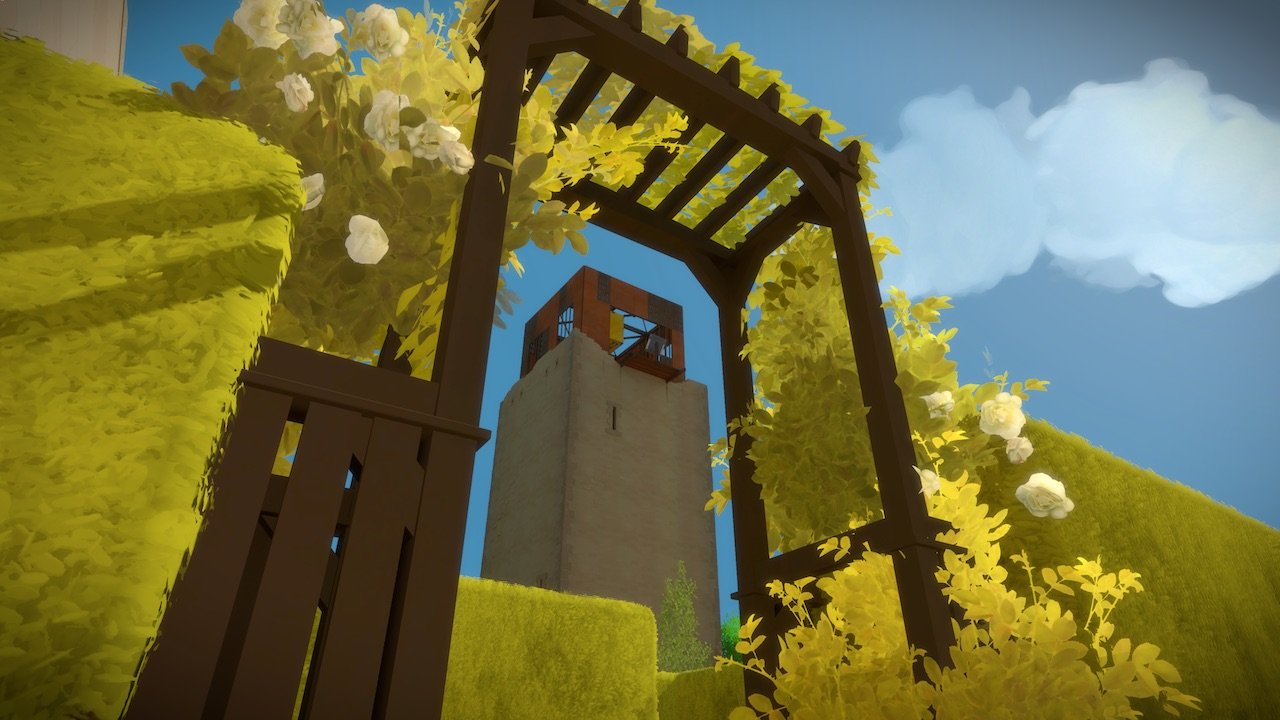
If you're looking for satisfying answers to these questions and many of the others you might have, I've got some bad news for you: The Witness doesn't really have a story, at least in the sense that a story has things like 'characters' or a 'plot' with 'events that happen'. The Witness, like Braid before it, revels in its ambiguity. Most of the audio diaries you find hidden around the island are merely recordings of famous quotes from various scientists, philosophers, religious leaders, and the few diaries you find that do supply some illumination as to the nature of the island only provide the tiniest peek behind the curtain, leaving much of its 'story' up to interpretation. The Witness, then, isn't about telling a 'story', so much as it is about fully exploring a concept: the nature of epiphany, and how a new set of information can affect our understanding of the world around us.
Now, this is probably the bit where you start to roll your eyes and think to yourself "Oh, boy, here we go" - and I don't blame you. I enjoy a healthy dose of pretentiousness in moderation, but even I wished everyone would just stop reading so many damn books for a minute and go watch Max Rockatansky kick some War Boys in the face. Life doesn't always have to be so self-serious all the time, but The Witness fully embraces its contemplative nature. That's not necessarily a bad thing, but you have to set some preconceived notions to the side and embrace The Witness' pretension as a lecture about knowledge disguised as a puzzle game.
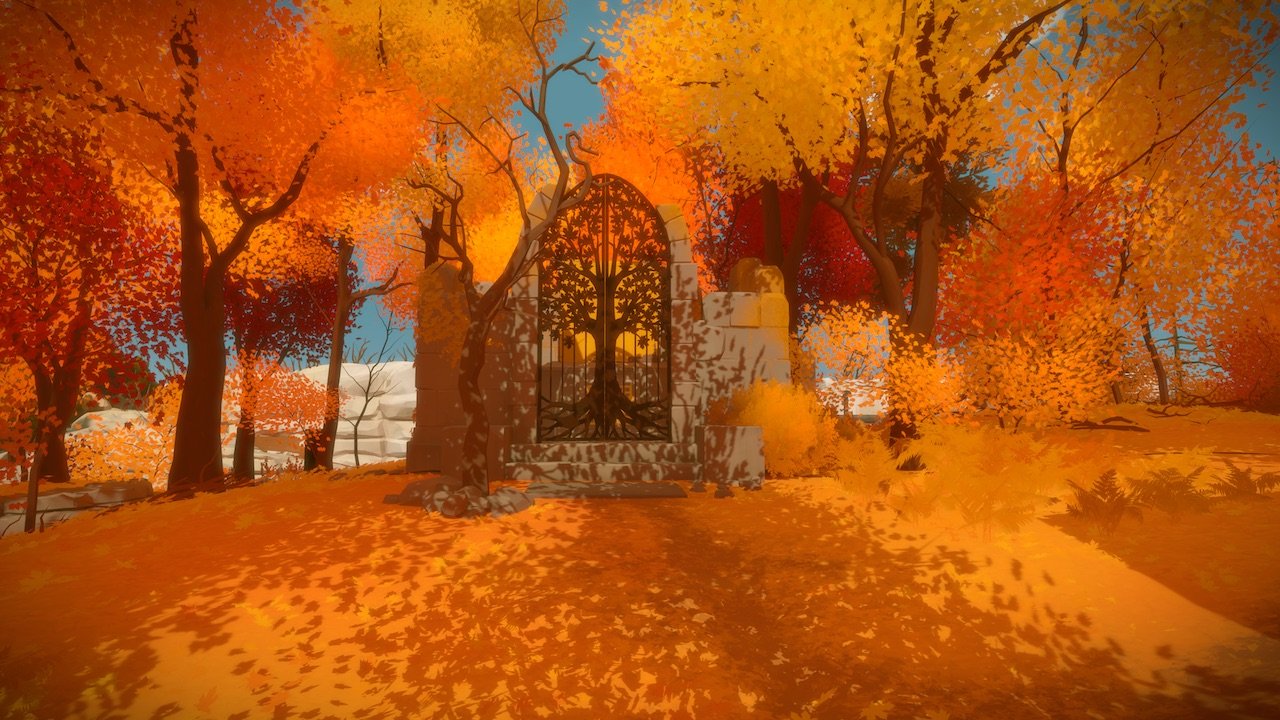
Philosophers call this study of knowledge 'epistemology', but it's not just the study of what we constitute as fact. Epistemology is also about the perception of truth, about belief and whether belief makes something true. Epiphany, then, is an extension of that, bringing along some insight (divine or otherwise) that changes everything you believed to be true. It's rarely because of some sudden 'Eureka' moment, though, like a cartoon gear clicking into place in our brains that causes the engine of our minds to spark to life. Rather, epiphany is the result of additional knowledge, a good amount of hard work, and time. Every single problem on the island that takes you hours to solve, every rule you learn, every hidden secret, audio diary, and video clip you find takes you one step closer toward the epiphany that The Witness is trying to make you, well, witness.
The knowledge you learn in The Witness starts out slow. Press X to make a dot appear on the screen. Position that dot on the larger circle of a puzzle screen, and move it toward the rounded nub at the end. The mazes start simple, then get more complex. Once you solve the initial set of puzzles, you move on and find a large grid covered in black and white symbols you've never seen before. Moving past that, you find a set of simple puzzles with those same set of black and white symbols. Here comes the first epiphany - you can solve that more complex puzzle you just passed with the information you learned here. And so, your perception of the world has changed just a little bit, all without a single tutorial to guide you.
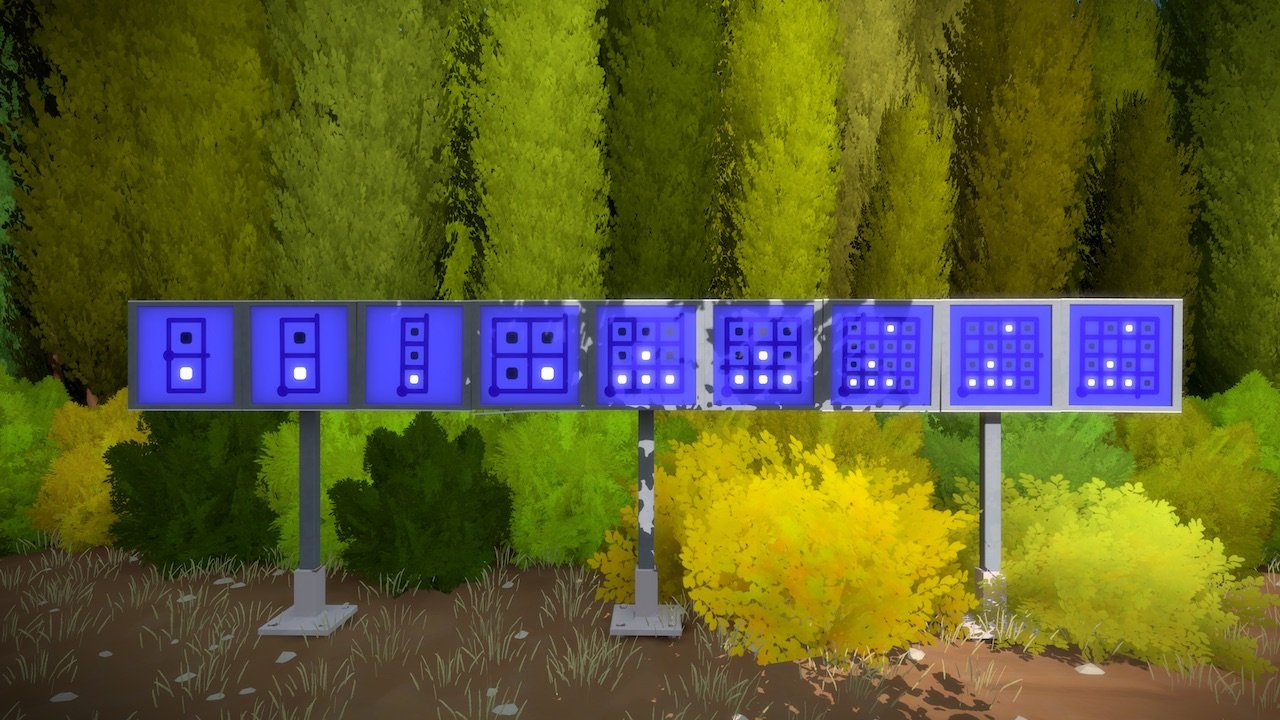
This continues while you play, as you notice that some areas are currently inaccessible to you because you lack the knowledge to interact with their puzzle grids. But as you explore, you begin to make some order out of chaos, figuring out where various puzzle 'concepts' are located by noting landmarks, and taking the knowledge gleaned from those places and applying them to trickier puzzles throughout the island. Meanwhile, you're likely noticing those aforementioned stone statues and audio diaries, trying to piece together some semblance of meaning on this island. One of the diaries mentions the life-changing process of seeing the smallness of the Earth from space (known as the overview effect), another mentions a quote from Arthur Eddington describing the scientific impossibility of entering a room. A code hidden behind that first complex puzzle door seems inconsequential at first, until you use it in a makeshift theater found underneath the windmill, which then plays a video describing scientists as the "true driving force of humanity".
Weekly digests, tales from the communities you love, and more
But that's not the only truth that The Witness provides. Audio diaries also include teachings of the Buddha, or philosophers like William K. Clifford who discuss the nature of doubt. Additional videos provide different modes of thought - one shows new agey gurus speaking of finding one's self, another shows a lecturer from the 1950s discussing that universal truth exists somewhere between science and the abstract, and to devote one's self to one or the other exclusively misses the forest for the trees. Each of these videos offers a different glance at the same reality through a different lens, and all of them can be interpreted as 'true' by people who believe in them.
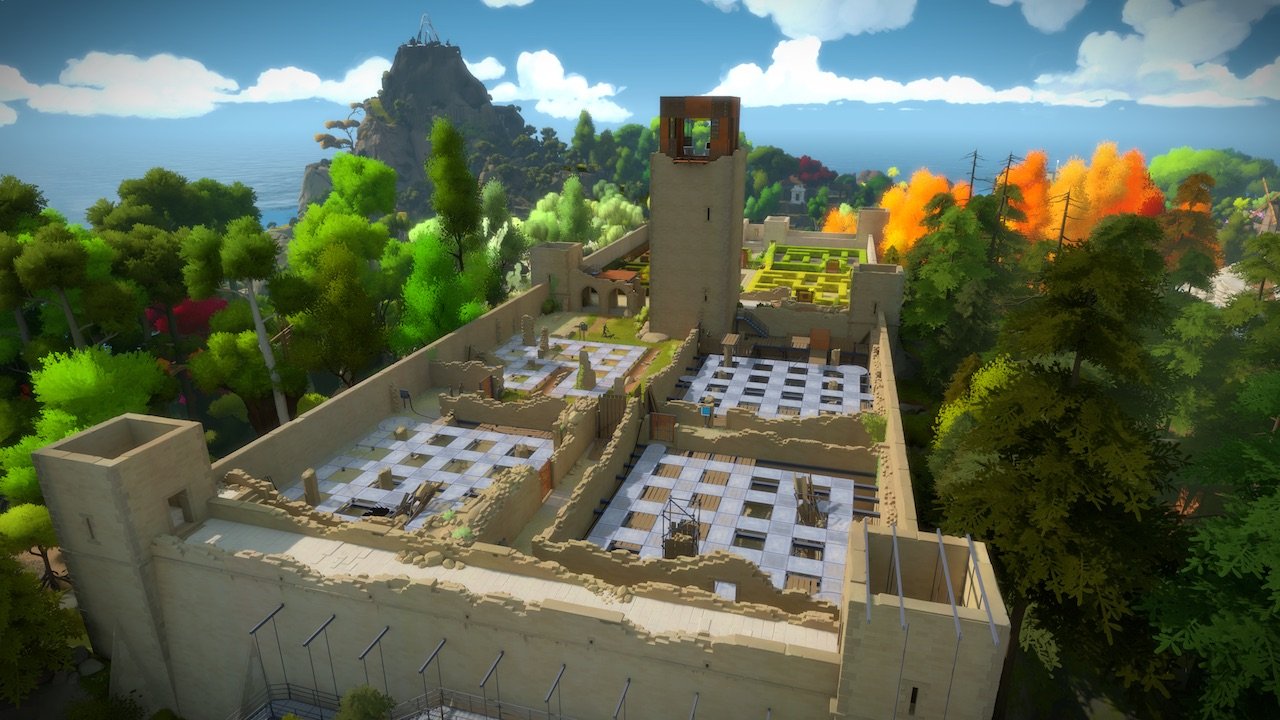
And then, while you're wandering around the island after a dozen hours or so, solving puzzles while staring at the same pieces of architecture, the same clouds, the same trees for a while, something happens. Something clicks. The moment when it happens is different for everyone. For some, it's at the top of the mountain, staring down at the river below. For me, it was a text I got from my friend. Head to the top of the castle and look down at the maze below, he said. I did, and what I saw took my breath away: a maze puzzle built out of the environment itself, with a big circle at the start, and a tiny nub at the end. I started seeing them everywhere after that moment: in the sky, on the ground, while wandering around the island in the boat. Suddenly, The Witness was blown wide open - everything I thought I knew about the game was changed in an instant. An epiphany.
Now, you're seeing lines everywhere, as well as new images created by a fresh perspective. You're solving puzzles, activating lasers, making your way into the bowels of the mountain, and you finally finish the last few trials at the end of your journey. You enter an ethereal Wonkavator that takes you soaring above the island, and you get to watch as every single puzzle in the game resets, all of your hard work is undone. It's easy to think of this as one last middle finger from Blow as you end where you started, the words "Start a New Game" flashing on the screen, beckoning you to hop right back in and solve the same puzzles again. But think about the nature of the game: now armed with all of the knowledge of the island, you're set to see the puzzles that gave you a hard time before in a whole new light, while perhaps sussing out even more tricks than you did previously.
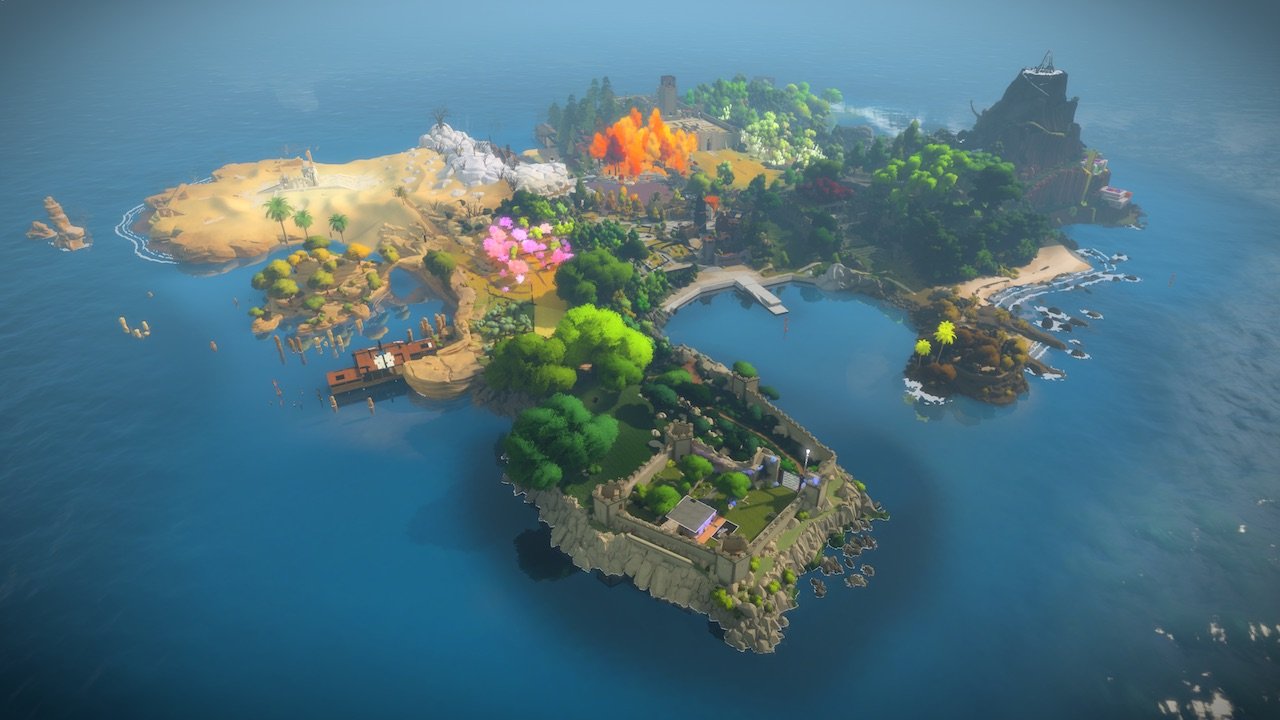
This is evident right away, as you take your first steps out into the introductory courtyard. Hidden here, before you solve your first real puzzle, is access to the true ending of The Witness, where the real nature of the island is revealed and you get the game's version of a credits sequence. The line puzzle hiding this door has been here the whole time. You could have found it within minutes of starting a new game, but without the knowledge the island provides, you probably passed right by it without a second thought. Thus, the end of your journey becomes the beginning, and the beginning leads to the end - the very cycle of epiphany.
Pretentious? Hell yes, it is. I mean, the game has the audacity to hide a full, unedited clip of the last ten minutes of Andrei Tarkovsky's film Nostalghia, in which a man tries to carry a lit candle across an empty mineral pool, fails several times, succeeds, and then dies - a possible metaphor for the Sisyphean nature of human existence (or perhaps an analogue to solving The Witness' puzzles?). These clips, these quotes, its vague, nebulous narrative, it's all incredibly heavy-handed, yes, but all of it ties into a singular point: that The Witness succeeds if it gets you to examine the real world from a different point of view, however slight - even if that means merely finding line puzzles everywhere you go.



